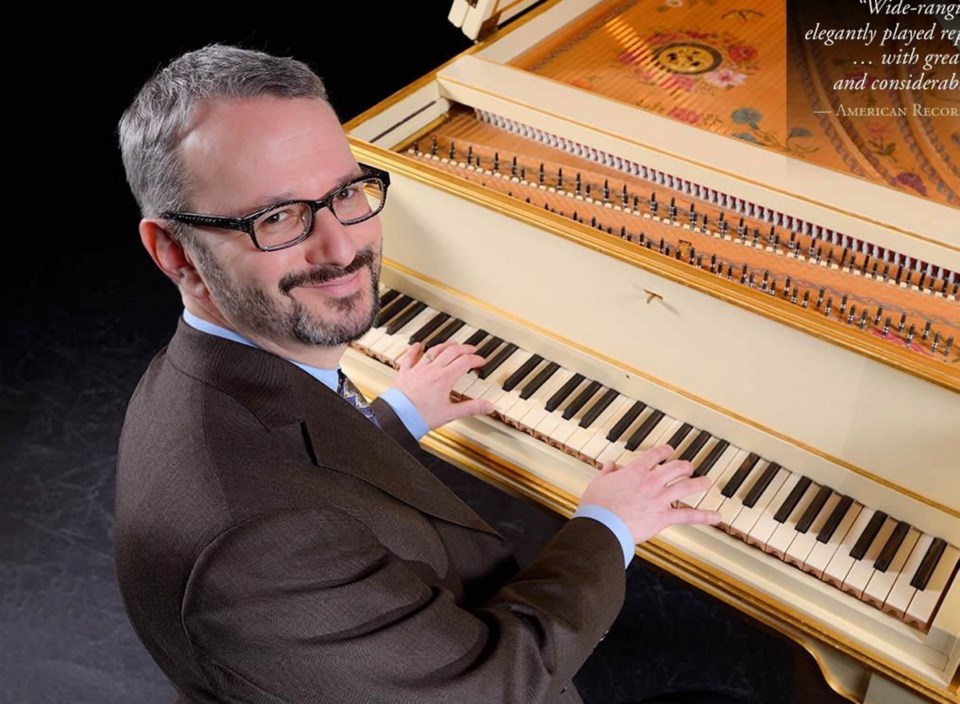Note: Some of these events have been cancelled.
Two very different early-music concerts can be eagerly recommended, though unfortunately, they will take place simultaneously on Saturday.
The more intimate one, sponsored by the Early Music Society of the Islands, will be a return visit from the concert series Byron Schenkman and Friends (8 p.m., Alix Goolden Hall, $30/$25/$23, student rush $8; pre-concert talk 7:10; earlymusicsocietyoftheislands.ca).
Founded by Schenkman, a harpsichordist and pianist, in 2013, and devoted to a wide range of Baroque and Classical chamber music, this series is based in Seattle, but also tours the Pacific Northwest and even New York.
Three of its regular members will perform on Saturday: Schenkman, on harpsichord; bassoonist Anna Marsh; and the internationally acclaimed recorder virtuoso Martin Bernstein.
The theme of Saturday’s program is Vivaldi in Paris. The fashionable Italian style was much resisted in insular France in the late 17th and early 18th centuries, though Vivaldi’s music (as Corelli’s before it) was popular enough to make inroads even there. The program comprises a sonata and a trio by Vivaldi juxtaposed with chamber and harpsichord works by a handful of his French admirers, including the greatest of them, François Couperin, a passionate Italophile who advocated a synthesis of French and Italian styles.
Also on Saturday, the Victoria Philharmonic Choir, conducted by Peter Butterfield, will tackle Haydn’s great oratorio The Creation (7:30 p.m., First Metropolitan United Church, $35/$10, under 13 free; vpchoir.ca).
The seed for The Creation was planted in 1795, near the end of Haydn’s second triumphant visit to England, when a London impresario gave him an old English libretto based on the Bible and Milton’s Paradise Lost. He had recently been overwhelmed by Handel’s oratorios, and longed to create a similarly lofty work for Austria. He began setting the libretto in 1796, back home in Vienna, and completed it in 1798, at age 65. It was one of his last works, and he seems to have regarded it as a testament.
The Creation has three parts. Parts 1 and 2 narrate the six days of Creation, with the archangels Gabriel, Uriel and Raphael (soprano, tenor and bass soloists) commenting on various natural wonders. In Part 3, set in Eden, Adam and Eve (bass and soprano) praise God’s work and express their love. Each part has “scenes” comprising recitatives, arias, ensembles and choruses.
The score is a veritable encyclopedia of Haydn’s style, variously sublime and pastoral, sacred and operatic, monumental and homely, sombre and playful, archaic and boldly modern. And it is pervaded with tone-painting: We hear Chaos, Creation, “hell’s spirits,” stormy seas, burbling streams, a sunrise, teeming plant and animal life, all rendered with imagination, colour and wit.
The work’s directness of expression and studied naïveté reflect Haydn’s sincere but also simple, cheerful, tolerant, optimistic religious faith. The music conveys a kind of childlike wonder, with results both awesome and touching.
The Creation was first performed privately, in Vienna, in 1798; its public première followed a year later. It was subsequently performed throughout Europe and almost universally revered by both connoisseurs and the public.
The Victoria Philharmonic Choir has never performed The Creation before, though it did perform The Seasons in 2008. (The CapriCCio Vocal Ensemble has performed The Creation here, most recently in 2016.)
On Saturday, the 80-voice choir, singing in English, will be joined by five vocal soloists and a large orchestra including members of the Victoria Symphony.
The University of Victoria’s School of Music has been celebrating its 12 years as an all-Steinway school this semester, with a series of four fundraising piano recitals.
The penultimate recital, tonight (8 p.m.), will showcase UVic piano students, while the final one, on Sunday (2:30 p.m.), will feature longtime UVic professor Bruce Vogt in works by Chopin and Liszt. (Phillip T. Young Recital Hall, by donation; finearts.uvic.ca/music/calendar.)
Vogt’s program will open with Chopin’s glittering Op. 18 waltz and continue with six of his nocturnes, while the second half will open with Liszt’s brilliant paraphrase on the waltz from Gounod’s Faust and continue with a selection of his experimental late works.
Vogt will also give a pre-concert talk devoted to these composers (1:30 p.m., MacLaurin Rm. B037; RSVP [email protected]).

-thumb.png;w=120;h=80;mode=crop)

